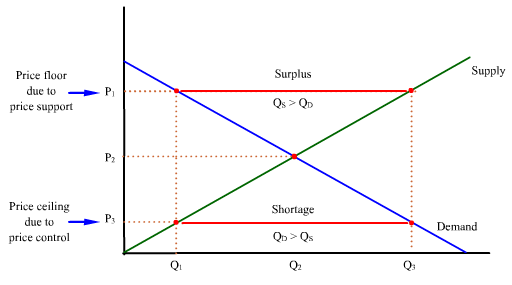One-Price Law – Making an Illegal Buck
Artificially-imposed price difference between markets can lead to flow of goods from short-supplied areas to well-supplied areas to equalize their effective prices.
China officially exports a large amount of gasoline to Vietnam which does not have any refineries. But it also unofficially imports an undeterminable amount of gasoline from Vietnam.
There is also a mysterious two-way flow of diesel oil between China and Hong Kong.
If it makes sense to ship oil products from China, why does it also make sense to ship the same oil products into China?
The oil products may well be identical, but their prices are not. The price of gasoline imported back from Vietnam is in fact lower than the price of the same gasoline sold in China due to the heavy price subsidy in Vietnam. The lower subsidized price is intended for the benefit of Vietnamese consumers. But smugglers have diverted the subsidized gasoline to siphon off the price differential between the lower-priced Vietnam's official market and the higher-priced China's black market.
The official retail price of ultra low sulphur diesel in Hong Kong is HK$5.99-HK$6.00 per liter. The illicit light diesel oil sold in the black market of Hong Kong is about HK$3.8 per liter. The price difference is due to Hong Kong's tax on the legal oil and the absence of tax on oil smuggled from China. Such oil is most likely purchased illegally at the much lower controlled price in China's official market and diverted to Hong Kong's black market.
But some diesel oil in Hong Kong intended for industrial and marine uses is tax exempt. It is the so-called "red" oil that has been dyed to prevent un-tax-exempt uses. Its tax-exempt price may be lower than the black-market price of similar oil in the price-controlled China's black oil market. So such tax-exempt oil has been smuggled into China from Hong Kong.
In an economy without tax and price control, it is natural for goods to flow from more abundant but lower-price market to less abundant but higher-price market. When all the dust settles, the price differential between the two markets for a given good should be no more than the transportation cost. This is the so-called one-price law. This process of directing material flow from abundant areas to less abundant area to even out price differential is legal and known as arbitrage.
But in a world with tax (or subsidy) and price control, goods no longer flow from abundant areas to less abundant areas. Instead, they flow from the less abundant but lower controlled-price market to the more abundant but higher taxed-price market. And this process of material flow is now illegal and known as smuggling.
Smuggling is illegal because it defeats the purpose of some well-intentioned government policies. Price control (or price subsidy) is supposed to benefit local consumers by introducing an artificially low price ceiling on short-supplied goods. Shipping price-controlled goods to higher-priced markets benefits unintended consumers and smugglers. High taxes on some goods might be intended to generate tax revenue. Import of goods from lower-taxed markets to higher-taxed markets without paying the higher tax deprives the local treasury of expected tax revenues.
By diverting short-supplied goods from the price-controlled (or price-subsidized) market, smuggling also makes the price-controlled goods even scarcer at the source market. And by increasing the supply of tax-avoided goods from lower-taxed market, smuggling introduces substitute goods into the higher-tax destination market where their supply might already be quite adequate.
Even though the material flow via smuggling might be in the wrong direction, the one-price law still brings about the result of evening out prices between markets. Diverting goods from the price-controlled source market has the net effect of raising their effective market prices above the controlled price ceilings and lowering their effective market prices in the destination market. And increasing the supply of tax-avoided goods into the higher-taxed and higher-priced destination market has the net effect of lowering their effective market prices in the destination market. And increasing the supply of tax-avoided goods into the higher-taxed and higher-priced destination market has the net effect of lowering their effective prices in the destination market.
References:
- WSJ. 2/13/2007. "China's cloudy oil data."
- "Control of illicit oil." Hong Kong Customs and Excise Department [Internet]. March 2003 [cited 2/15/2007]: Available from: http://www.customs.gov.hk/eng/notice_diesel_e.html
Glossary:
- arbitrageThe purchase of goods at a market where prices are lower to sell at a market where the prices are higher. These markets could be separated by geography or time. More generally, it is an attempt to gain profit by exploiting differences in prices, and other market-related conditions for similar products or situations.
- price ceilingWhen prices are set artificially below the market-clearing level, the controlled price is a ceiling above which it is not allowed to rise. A price ceiling would result in excess demand or shortage.

- price controlSetting the price below the market-clearing level.

Topics:
Keywords
arbitrage, China, diesel, gasoline, Hong Kong, material flow, one-price law, price control, red oil, smuggling, subsidy, tax, Vietnam
